Bigger is not always better. And for all the things that Assassin’s Creed Mirage achieves and does well in its own right as a game of stealth fantasy, it’s difficult not to think about it in comparison to recent, sprawling RPG entries in the franchise – Origins, Odyssey, and Valhalla – and think, “Wow, this is nice. Why did this series ever change?”
Framed as a standalone tale in the much grander Assassin’s Creed mythos, Assassin’s Creed Mirage follows the humble origin story of Basim, a restless street thief pining to do something more meaningful with his life. While the previous Assassin’s Creed game, Valhalla, eventually reveals that his role in the world is more significant than he could have ever dreamed, Mirage thankfully stays mostly focused on the growth of Basim as a person, the people who help along his personal arc, and the period and city that shapes him – 9th-century Baghdad.

Raised there briefly before returning as part of his formative missions for The Hidden Ones (the collective that would become the titular Assassins of the series), Basim rediscovers the city from a new perspective, as you discover its joys for the first time. Comprised of densely packed neighbourhoods filled with buildings and people, it makes for a wonderful playground to run up, down, and around in, as well as an enticing labyrinth of possibilities for clandestine activities.
With no mini-map to distract you, Assassin’s Creed Mirage cleverly makes sure you learn to “read” the streets to get where you need to go, identifying opportune starting points for free-running that will take you up off the ground, lead you across several conveniently placed rooftops, bouncing off washing lines, pole-vaulting across streets, swinging around corners, and zip-lining across rivers in one long swoop. Clear signposting of optimal paths, and the fascinating sights and sounds of street life along the way, keeps moving from place to place in Baghdad exciting.
Read: Learn by doing, not killing: The origins of Assassin’s Creed Discovery Tour
It’s a city full of idle opportunities – you’ll find joy walking the city and keeping an eye out for exposed coin purses to pickpocket, or stumbling across a building that houses a tantalising chest. That might lead you to case the joint, searching for a window to slink through, an opportune way to break the door’s lock from the outside, or a key to pilfer from the nearby owner to get at the contents inside, whether it be valuable crafting components or a new weapon.
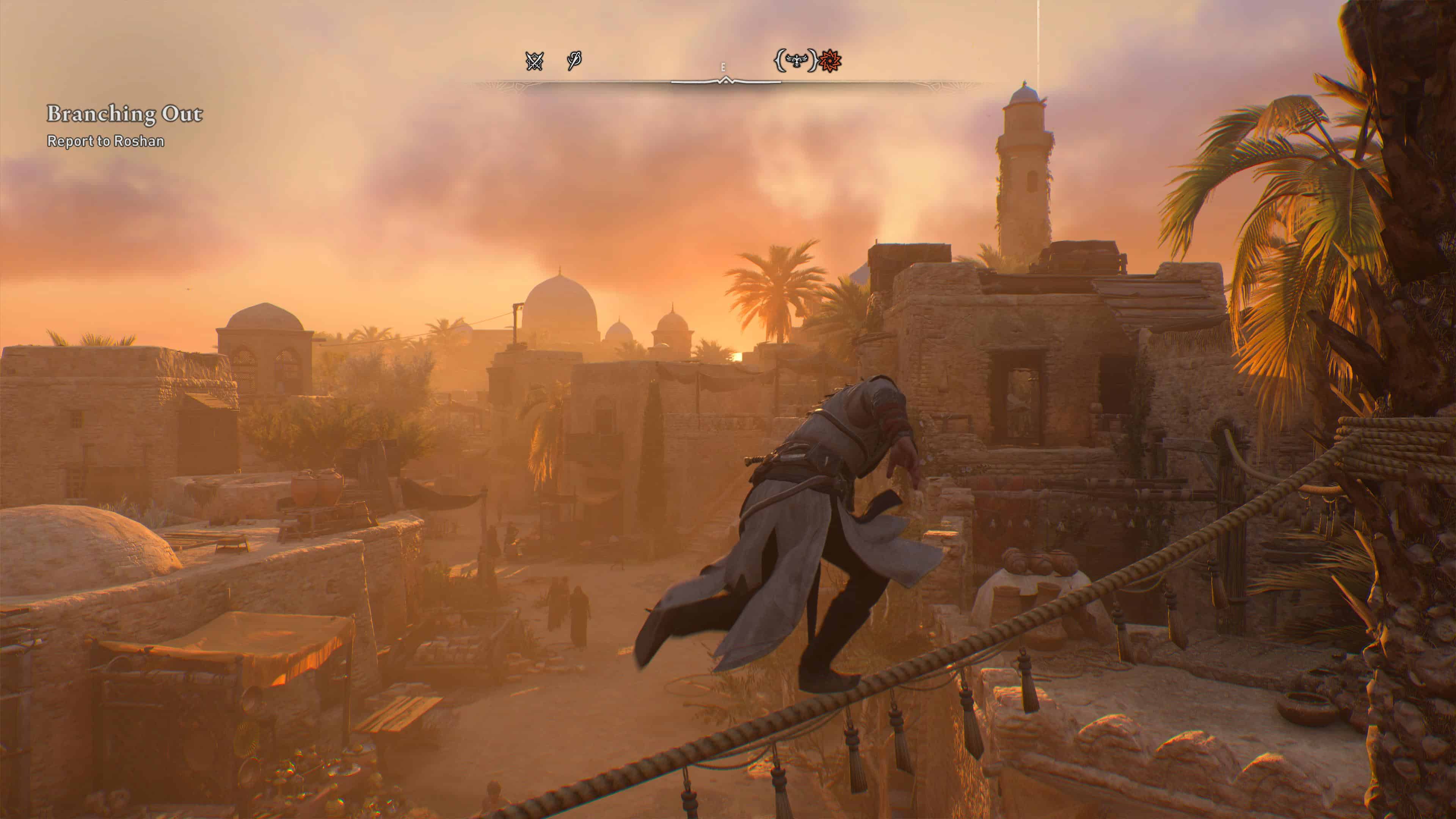
Baghdad is a beautiful and lively city, and I found myself soaking in the atmosphere far more often than I expected to – it’s again hard not to compare this experience to my heavily goal-orientated approach with the Assassin’s Creed games that preceded Mirage, behemoth RPGs whose worlds and quests never seemed to end. In Mirage, I felt more comfortable taking a moment to watch the rug salesman unfurl his wares, seek out and eagerly read the museum-like nodes that provide real-world historical context to the virtual recreation. These artistic efforts mirror those in the sprawling words of Odyssey and Valhalla, but knowing that Baghdad was the only place I needed to care about in Assassin’s Creed Mirage encouraged me to get to know it intimately, and motivated me to build a closer connection and attachment to its streets.
Whether informed by predetermined design restrictions or otherwise, Assassin’s Creed Mirage is also one of the more character-driven narratives in the series, and a strong example of it, given the more natural pacing afforded by the game’s overall length, which is about 20 hours for a leisurely playthrough. It’s pushed forward by Basim’s story of personal growth – his eagerness to impress his Master Roshan and carve out his place in The Hidden Ones – moreso than the grander plot beats, and it makes for a story that is easier to connect to and get invested in.
Read: Assassin’s Creed Mirage is a more grounded, character-driven tale – Interview
Basim is warm and earnest, which makes him easy to like, and some small but meaningful, often poignant moments of character work help flesh out the supporting cast, making them feel memorable as well – a minor backstory detail about a kite left a surprisingly lasting impression on me. Special mention must also be made to the game’s Arabic-language voice track, which has some noticeably different interpretations of the characters. It feels more lively and overall more consistent in tone compared to the default English voice track, on top of being more in-line with the game’s setting.
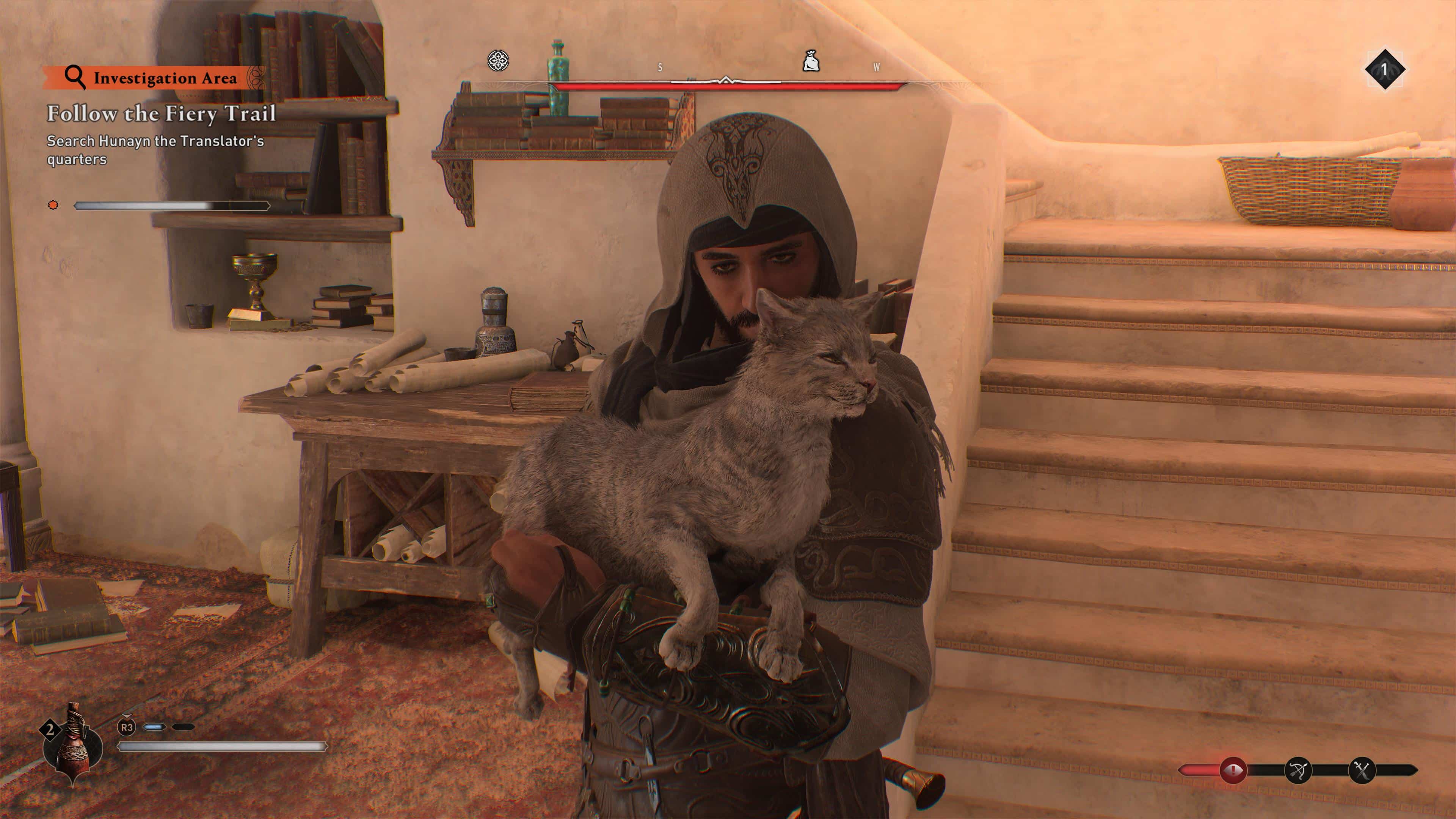
With Basim’s story involving his evolution as a confident member of the Assassin order, it means that Assassin’s Creed Mirage reverts to a heavy stealth fantasy focus, as was the case when the series first began. The stealth mechanics and scenarios, which involve a lot of close observation and investigation of Baghdad’s environments and structures, suit Mirage’s honed focus well, making the most of the detailed environment, and more personal and political plot beats.
Tasked to track down and kill the unidentified members of the secretive and pervasive Order of Ancients, Basim’s quests will guide him through a series of investigations that involve more active quest objectives like breaking into high-security prisons, as well as more low-key investigations like rifling through documents to uncover clues that will point Basim to the right target.
The major missions that these investigations lead up to are incredibly entertaining, typically taking place inside a grand structure with multiple paths toward your assassination target. You might need to do things like explore and uncover a code phrase to get through a guarded entrance, eavesdrop on conversations to uncover the next step in the puzzle, bribe guards to look the other way, or pay someone else to distract them for you. These are paint-by-numbers pathways, to be clear, as opposed to freeform systems that you can opt in and out of, or can potentially fail (as in its closest comparison, Hitman), but the interactive fantasy they provide as part of the consistently rolling narrative of the game is enjoyable regardless.
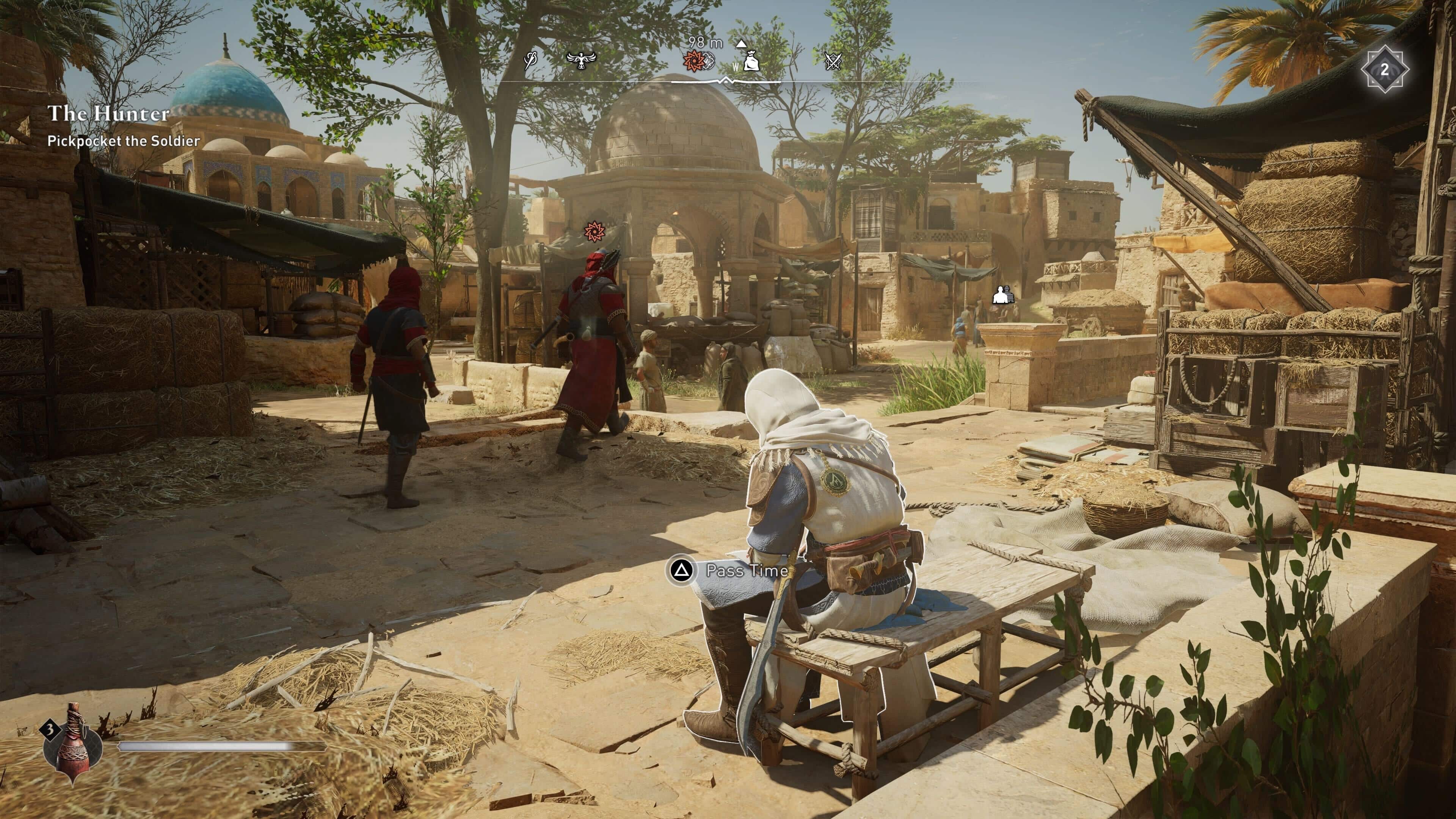
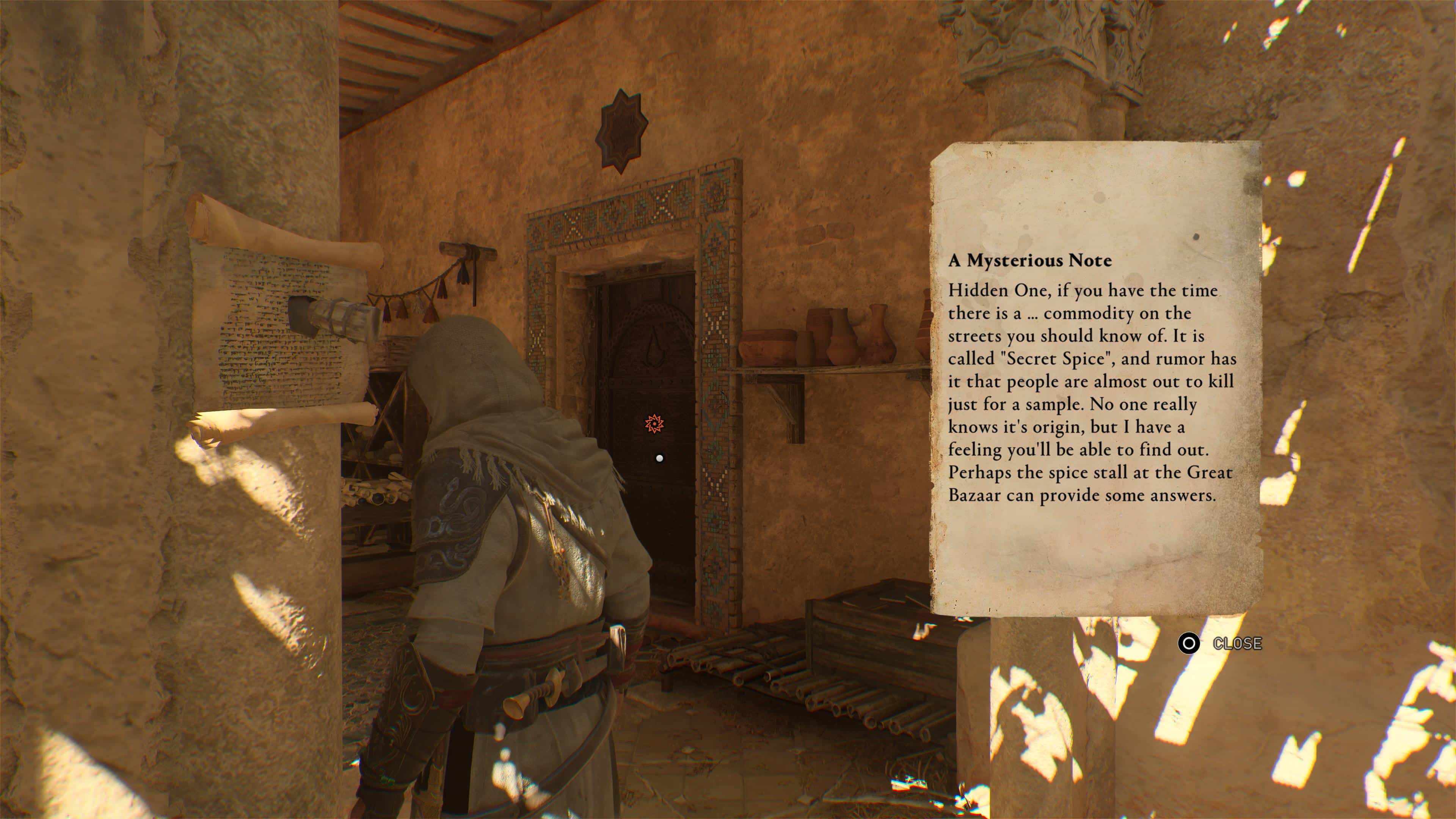
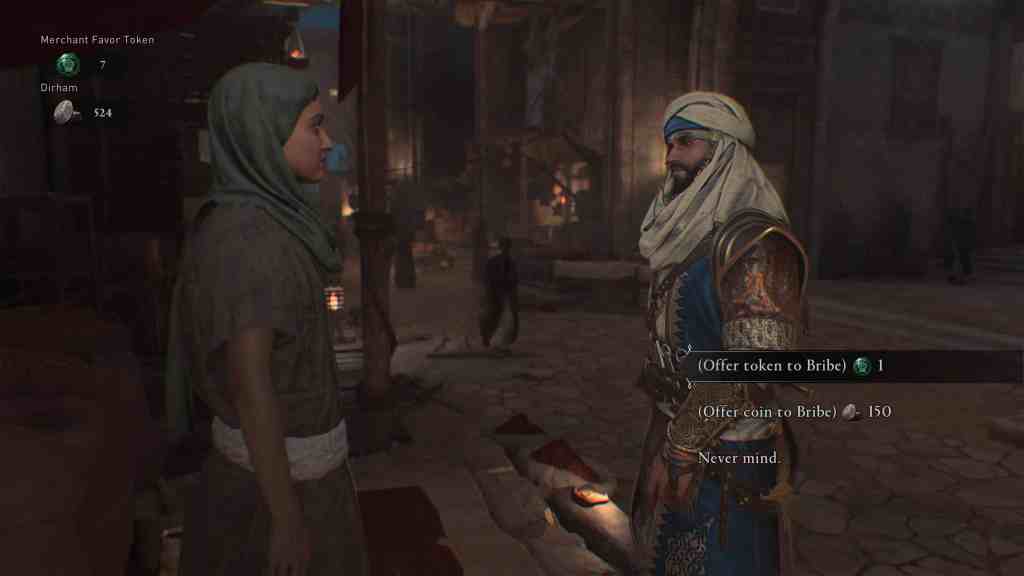
And of course, there is much greater agency to be found when it comes to the core stealth loop of Assassin’s Creed Mirage. From breaking into new locations unnoticed, dispatching guards, and making out with your objective, there are plenty of thrills to be found, on account of how much can go wrong, and how seemingly impenetrable some of these scenarios first appear to be. You can always fight your way in and out, of course, but despite the nice-looking sword fighting animations and the satisfaction of a good parry, the combat mechanics are a bit too cumbersome to rely on – likely by design.
Instead, tools like throwing knives, smoke bombs, and noisemakers give you nice options to help you maintain or re-obtain your cover at all costs. The eagle mechanic returns from previous games, which allows Basim to scout an area for guards and key objectives from the sky, and Mirage also introduces a new meter-dependent supernatural ability that allows Basim to assassinate multiple targets in the blink of an eye. These core stealth tools make infiltrations very entertaining to do again and again – with several optional side missions reusing major locations in different ways to test your mettle, tempting you with increased rewards for achieving more challenging objectives, like remaining undetected or making zero kills.
And it’s the thrill of a stealth operation well done that makes Assassin’s Creed Mirage so enjoyable, even if its more interesting ideas are predetermined outcomes. The satisfaction of pickpocketing a key from a guard unnoticed at a busy rooftop party, or bribing a guard to leave a woman alone before turning around and stealing that currency as soon as his back is turned. The giddiness you get from dropping a pallet of bricks on someone, or the gratifying feeling of having Basim zip around to dispatch five guards in one quick flash.

Some familiar mechanical foibles of Assassin’s Creed can still get in the way, however. The context-based execution of many of Basim’s actions can be hit or miss – sometimes annoyingly so, like when a vital assassination fails because Basim swung his sword instead of silently killing a guard, blowing your entire cover.
Basim’s free-running stickiness can also sometimes be your worst enemy, potentially perching and trapping you onto a tiny piece of geometry while trying to escape, refusing to let you move up or down while pursuing guards close in.
These imperfections feel like they’ve been issues in some form or another throughout the whole series, but they feel a little more egregious here because of how vital a role stealth plays once more. The flow of action in Assassin’s Creed Mirage is something you need to consciously reign in and steer – but when it works, it’s magic.
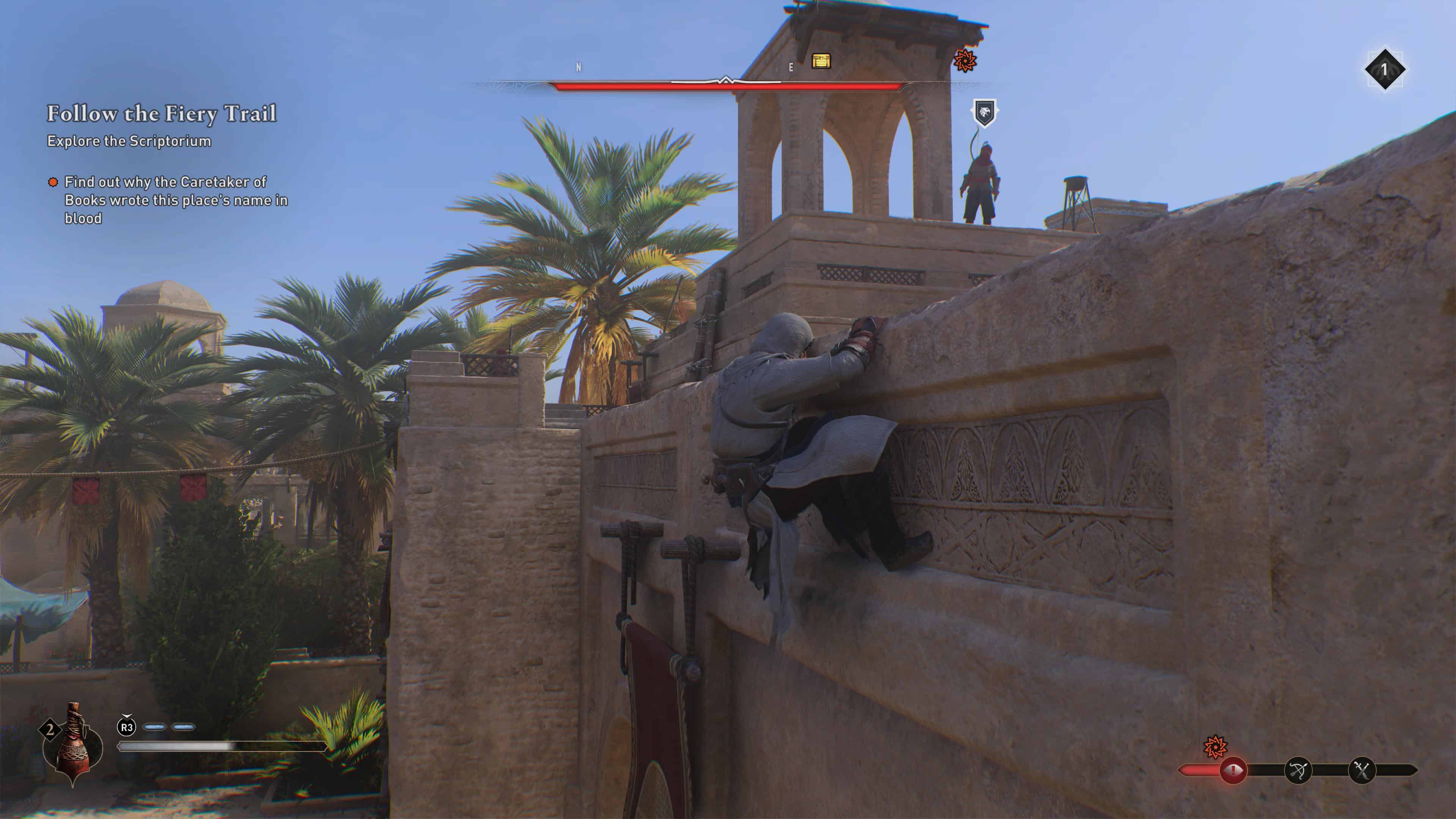
Assassin’s Creed Mirage is a great stealth fantasy game, with a fantastic setting you want to just simmer in, and a pace that gently but consistently pulls you through interesting missions you find yourself eager to tackle. Its focused scope gives you the breathing room to invest more interest and care in the makeup and history of the world, along with the plights of its characters, and leaves you feeling content with the time you spent in it. This is how all Assassin’s Creed games should be.
Four Stars: ★★★★
Assassin’s Creed Mirage
Platforms: PC, PS5, PS4, Xbox Series X/S, Xbox One, iOS
Developer: Ubisoft Bordeaux
Publisher: Ubisoft
Release Date: 5 October 2023
|
$29.99
|
|
|
The PlayStation 5 version of Assassin’s Creed Mirage was provided and played for the purposes of this review. GamesHub reviews are scored on a 5-point rating scale. GamesHub has affiliate partnerships. These do not influence editorial content. GamesHub may earn a small percentage of commission for products purchased via affiliate links.








